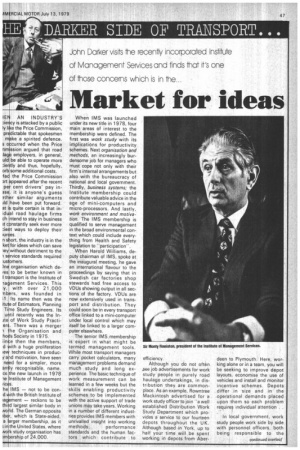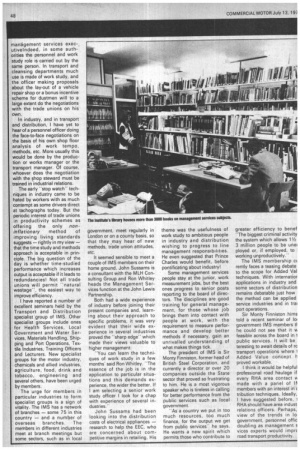Market for ideas
Page 49

Page 50

If you've noticed an error in this article please click here to report it so we can fix it.
John Darker visits ne recently incorporated Institute of Management Services and finds that it's one of those concerns which is in
IE AN INDUSTRY'S ie cy is attacked by a public ly li e the Price Commission, pr dictable that spokesmen
m ke a spirited defence. s o curred when the Price nm ssion argued that road lag employers, in general, uld be able to operate more -.;ie fly and thus, hopefully, orb some additional costs. Ia. the Price Commission Dit ppeared after the recent pe cent drivers pay in , it is anyone's guess ath r similar arguments ild have been put forward. at i quite certain is that inid al road haulage firms eh ntend to stay in business ;t c nstantly seek ever more ie t ways to deploy their iur 6S.
n s ort, the industry is in the ke for ideas which can save ley without detriment to the 1s rvice standards required :us omers.
)ri organisation which dees to be better known in I tr nsport is the Institute of ement Services. This y, with over 21,000 rib-rs, was founded in -1. Its name then was the itu e of Estimators, Planning Ti e Study Engineers. Its u til recently was the Inate of Work Study Practier There was a merger he Organisation and ho s Society in 1975.
in e then the members, d ith a huge proliferation le techniques in producy a d motivation, have seen n d for a simpler, more an ly recognisable, name. ce the new launch in 1978 le Institute of Management (lc s.
IMS — not to be cond ith the British Institute of ment — reckons to be thi d largest similar body in No Id. The German opposite ib;r, which is State-aided, a arger membership, as it ; in the United States, where NO k study organisation has am ership of 24,000.
When IMS was launched under its new title in 1978, four main areas of interest to the membership were defined. The first was work study with its implications for productivity schemes. Next organisation and methods, an increasingly burdensome job for managers who must cope not only with their firm's internal arrangements but also with the bureaucracy of national and local government. Thirdly, business systems; the Institute membership could contribute valuable advice in the age of mini-computers and micro-processors. And lastly, work environment and motivation. The IMS membership is qualified to serve management in the broad environmental context which could include everything from Health and Safety legislation to "participation".
When Harold Williams, deputy chairman of IMS, spoke at the inaugural meeting, he gave an international flavour to the proceedings by saying that in Swedish car factories shop stewards had free access to VDUs showing output in all sections of the factory. VDUs are now extensively used in transport and distribution. They could soon be in every transport office linked to a mini-computer under local control which may itself be linked to a larger computer elsewhere.
The senior IMS membership is expert in what might be termed management tools. While most transport managers carry pocket calculators, many management problems demand much study and long experience. The basic technique of work measurement can be learned in a few weeks but the skills enabling productivity schemes to be implemented with the active support of trade unions may take years. Working in a number of different industries provides IMS members with unrivalled insight into working methods, performance standards and the human factors which contribute to efficiency.
Although you do not often see job advertisements for work study people in purely road haulage undertakings, in distribution they are commonplace. As an example, Rowntree Mackintosh advertised for a work study officer to join "a well established Distribution Work Study Department which provides a service to our fourteen depots throughout the UK. Although based in York, up to half your time will be spent working in depots from Aber
deen to Plymouth. Here, working alone or in a team, you will be seeking to improve depot layouts, economise the use of vehicles and install and monitor incentive schemes. Depots differ in size and in the operational demands placed upon them so each problem requires individual attention .
In local government, work study people work side by side with personnel officers, both being responsible to the
man.6gement services exec-, utivelndeed, in some authorities the personnel and work study role is carried out by the same person. In transport and cleansing departments much use is made of work study, and the officer making proposals about the lay-out of a vehicle repair shop or a bonus incentive scheme for dustmen will to a large extent do the negotiations with the trade unions on his own.
In industry, and in transport and distribution, I have yet to hear of a personnel officer doing the face-to-face negotiations on the basis of his own shop floor analysis of work tempo, methods, etc. More usually this would be done by the production or works manager or the transport manager. Of course, whoever does the negotiation with the shop steward must be trained in industrial relations.
The early ''stop watch" techniques in industry came to be hated by workers with as much contempt as some drivers direct at tachographs today. But the periodic interest of trade unions in productivity schemes as offering the only non
inflationary method of improving living standards suggests — rightly in my view — that the time study and methods approach is acceptable in principle. The big question of the day is whether time-studied performance which increases output is acceptable if it leads to redundancies! Not all trade unions will permit "natural wastage", the easiest way to improve efficiency.
I have reported a number of excellent seminars held by the Transport and Distribution specialist group of IMS. Other specialist groups include ones for Health Services, Local Government and Water Services, Materials Handling, Shipping and Port Operations, Textile Industries, Training Officers and Lecturers. New specialist groups for the motor industry, chemicals and allied industries, agriculture, food, drink and tobacco, engineering and several others, have been urged by members.
The urge for members in particular industries to form specialist groups is a sign of vitality. The IMS has a network of branches — some 75 in this country — and a number of overseas branches. The members in different industries meet at branch meetings but some sectors, such as in local
government, meet regularly in London or on a county basis, so that they .may hear of new methods, trade union attitudes, etc.
It seemed sensible to meet a couple of IMS members on their home ground. John Sussams is a consultant with the MLH Consulting Group and Ron Whitley heads the Management Services function at the John Lewis Partnership.
Both had a wide experience of industry before joining their present companies and, learning about their approach to specific problems, it was very• evident that their wide experience in several industries proved the "sharp edge" which made their views valuable to higher management.
'You can learn the techniques of work study in a few months' said Ron Whitley. -The essence of the job is in the application to particular situations and this demands experience, the wider the better. If I am selecting a senior work study officer I look for a chap with experience of several industries.''
John Sussams had been looking into the distribution costs of electrical appliances — research to help the EEC, who are concerned about competitive margins in retailing. His theme was the usefulness of work study to ambitious people in industry and distribution wishing to progress to line management responsibilities. He even suggested that Prince Charles would benefit, before pontificating about industry!
Some management services people stay at the junior, work measurement jobs, but the best ones progress to senior posts reporting to the board of directors. The disciplines are good training for general management, for those whose job brings them into contact with people at work, with the requirement to measure performance and develop better methods if necessary, gain an unrivalled understanding of what makes things tick.
The president of IMS is Sir Monty Finniston, former head of British Steel Corporation, and currently a director or over 20 companies outside the State sector that proved so frustrating to him. He is a most vigorous speaker who is tireless in calling for better performance from the public services such as local government.
-As a country we put in too much resources, too much finance, for the output we get from public services'' he says. He wants a new spirit which permits those who contribute to greater efficiency to benef -The biggest criminal activity the system which allows 11/2 3 million people to be unei ployed or, if employed, to working unproductively."
The IMS membership ct rently faces a teasing debate to the scope for Added Val techniques. With internatior applications in industry and some sectors of distribution remains debatable just how the method can be applied service industries and in trai port operations.
Sir Monty Finniston hims told a recent seminar of lou government IMS members tl he could not see that it w feasible across the board in public services. It will be teresting to await details of rc transport operations where I Added Value concept h proved workable.
I think it would be helpful professional road haulage if every RHA area contact vi made with a panel of If! members with an interest in c tribution techniques. Ideally, I have suggested before, BHA should have area indust relations officers. Perhaps, view of the trends in lo government, personnel off ic doubling as management 5. vices experts would imprc road transport productivity.








































































































































